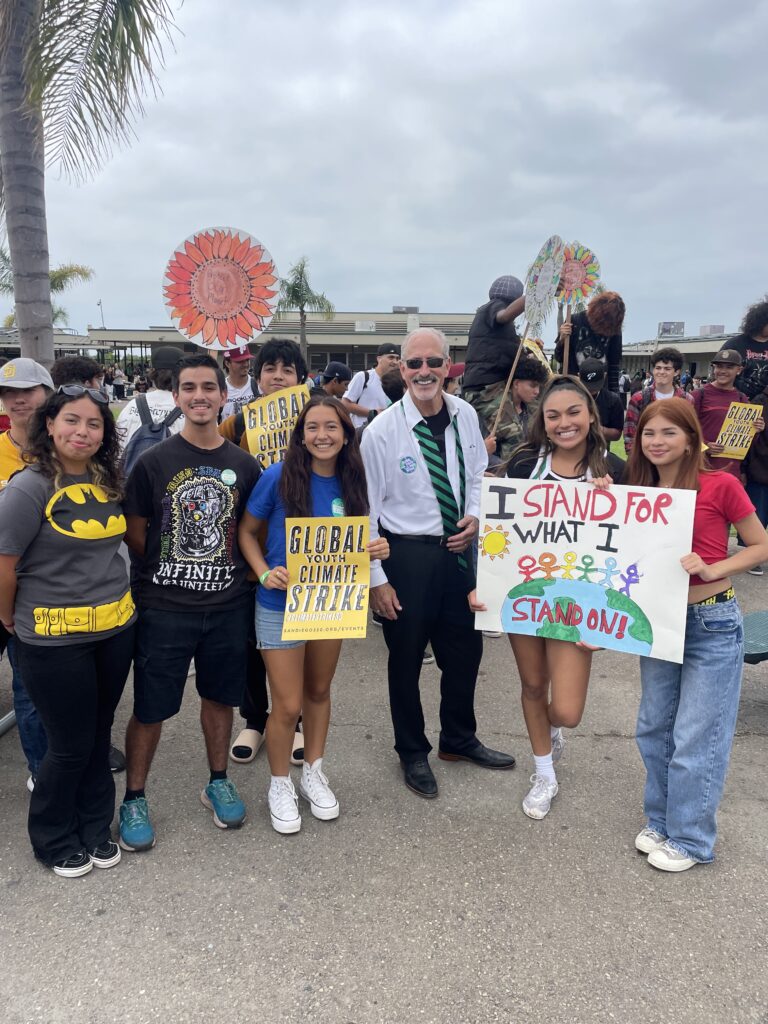By Abigail Costello

Growing up in San Diego, specifically Chula Vista, my dad often took me on hikes, biking, or to the beach, which sparked my environmental awareness. In early 2020, as climate change gained prominence in the media, I realized how its effects perpetuated injustices impacted my community. Entering high school, I joined the eco-club, Youth 4 a Sustainable Future, eventually becoming president. Our main project, partnered with South Bay Sustainable Communities, involved rescuing food waste from lunch. Organic waste in landfills produces methane, a potent greenhouse gas. We compost organic waste, recycle non-organics, and donate untouched food to local food-insecure communities. This teaches students they can impact their communities through simple actions.
Under the CAL EPA grant, I have gotten the opportunity to spread awareness about environmental justice and bring more widespread climate action to my community, Chula Vista, which is home to some of the most at-risk communities in terms of the effects of climate change in San Diego County. We have higher asthma and cardiovascular disease rates than the rest of the county, proportionate to the high levels of diesel particulate matter in the air which is not surprising given our proximity to the congested border lines where people leave their car engines running for hours on end as they wait to pass through. Furthermore, as is common in most low-income and BIPOC communities like ours, there is a general lack of access to green spaces and public transportation.
The goal of my internship as the Chula Vista Community Liaison Intern with SanDiego350 is to reverse this trend. I officially took on this role in June 2023, and have learned so much in this short time. During the onboarding process, I attended a field trip to the Living Coast Discovery Center with Kumeyaay Community College leaders and youth, led by Dr. Stan Rodriguez, president of KCC. As he spoke, I felt a sense of shame for not being knowledgeable on something so important to climate action, and this is when I realized that all other students needed the same education. He taught us about native species and sustainability practices on reservations, emphasizing the importance of indigenous knowledge in understanding environmental justice. He continued presentations like this for high school students at the three schools under this grant including my own, Hilltop.
Throughout the internship, I and our Youth Program Coordinator, Lexi, participated in local events like the Chula Vista Lemon Festival and South Bay Summer Fest, providing resources and recruiting youth volunteers. We organized a Town Hall event with speakers discussing the climate crisis’s impact on our community and promoted surveys on green bins, public health, and public transportation in English and Spanish. The feedback was presented to the City Sustainability Commission, ensuring diverse community voices were heard in local government.
Furthermore, students were taught to organize themselves for action through Hilltop’s (and San Diego 350/Youth 4 Climate’s) participation in the Global Youth Climate Strike – 2023. Despite admin refusing the traditional walkout format, we successfully held a protest in the center of campus, calling for immediate climate action by President Biden. Three students aside from myself spoke to media and gave speeches during the rally. We had a large crowd of students on stage, and it was incredibly inspiring to see the passion of my peers shown in such a public format. Additionally, we created a garden at Hilltop High to promote sustainability and honor our late librarian, naming it “Kim’s Garden.” The garden includes native plants to attract pollinators and serves as a practical sustainability education site for students.
This internship taught me that student engagement is driven by cultural or community values, such as indigenous knowledge and protecting family health from the impacts of fossil fuel reliance. I am excited to continue educating more students about the important actions like composting, demonstrations, and speaking to government officials. We hope to continue promoting the surveys and encompassing local opinions. We will also use our school compost on the garden space and pass on the role of caretaker of the garden to more students. By focusing on at-risk youths’ voices in the climate movement, we can ensure a more inclusive and effective approach to addressing environmental injustice.
